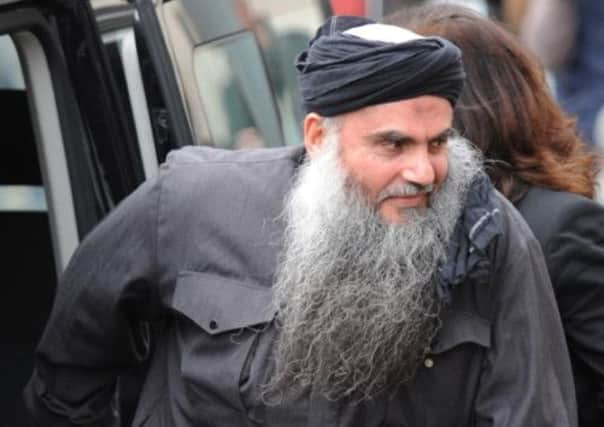Abu Qatada volunteers to leave Britain


After fighting deportation for nearly a decade, he has said he will return to Jordan when a treaty between it and the UK is ratified by both countries.
The treaty, unveiled by Home Secretary Theresa May last month, aims to allay fears evidence extracted through torture will be used against the terror suspect at a retrial.
Advertisement
Hide AdAdvertisement
Hide AdMeanwhile, Qatada, also known as Omar Othman, must wait to learn if he can be released from jail, after his bail application at an immigration tribunal was adjourned until 20 May.
The UK government has been trying for about eight years to deport Qatada to Jordan, where he was convicted of terror charges in his absence in 1999.
In a bid to address concerns raised by immigration judges about the use of torture in Jordan, Mrs May unveiled the new agreement with that country.
At the Special Immigration Appeals Commission yesterday, Qatada’s lawyer, Edward Fitzgerald QC, said: “If and when the Jordanian parliament ratifies the treaty, Mr Othman will voluntarily return to Jordan.”
He said Qatada’s vow to go back removed any risk he would abscond if released on bail.
“There’s never been a time in the last 12 years that Mr Othman and his family could safely return to Jordan,” he said. “For a long period of time, he has made it clear that he wishes to leave lawfully.”
Robin Tam QC, for the Home Secretary, said the new treaty would be laid before Jordan’s parliament in the next few weeks, while the UK side of the process should be completed by late next month.
Shadow home secretary Yvette Cooper said: “This could be very good news if it means Abu Qatada returns to Jordan as soon as possible.
Advertisement
Hide AdAdvertisement
Hide Ad“Abu Qatada should have made this decision a long time ago, as this legal process has dragged on far too long. We will watch the next steps closely until he departs, but I hope this saga can be brought to an end.”
Keith Vaz MP, chair of the home affairs select committee, said: “The Home Secretary must get on a plane to Jordan and secure ratification immediately before Mr Qatada changes his mind.”
He added he had written to Jordan’s prime minister asking about the ratification timetable.
Qatada was jailed in March for breaching bail conditions that stop him turning on mobile phones in his house.
The judge, Mr Justice Irwin, said that on 7 March, the cleric’s home had been searched by police. A total of 17 mobile phones, three USB sticks, one SD card, five digital media devices and 55 recordable CDs or DVDs were found. Qatada’s bail had been revoked in light of the suspected bail breaches, he said.
Mr Fitzgerald admitted Qatada had failed to exercise “due diligence” with his phones, but said many did not belong to him and that he had not used any of them illegally.
But Mr Justice Irwin described the breaches as “significant”.